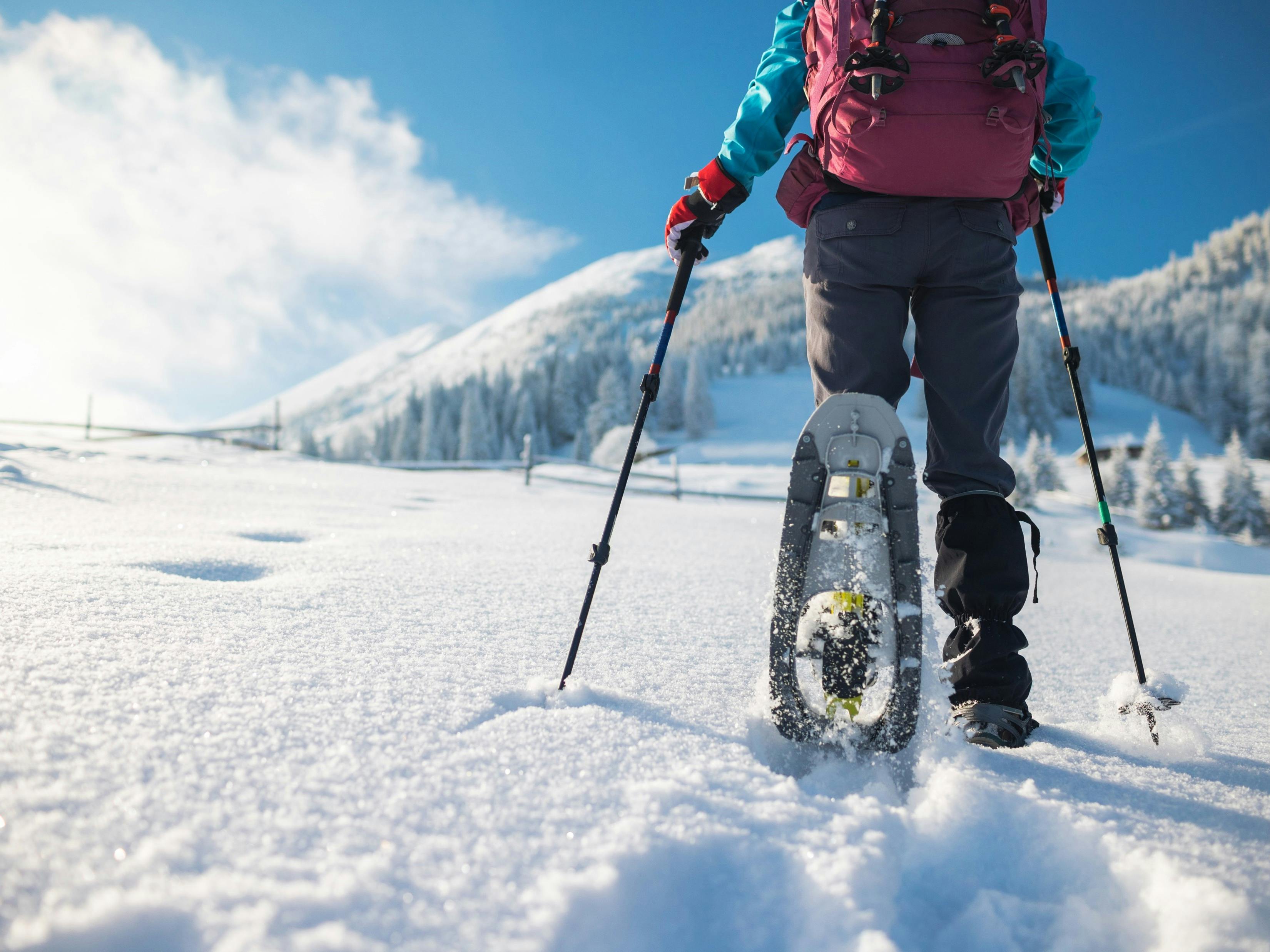
Stop hibernating and start snowshoeing! Learn why this winter sport is growing in popularity.
Mon-Thur 9am-7pm | Fri 9am-6pm EST
Do you hate the snow, even though you liked it as a kid? Maybe you just need a new way to play in it.
Spurred by pandemic concerns, snowshoeing has gained in popularity in recent years. More people are discovering the quiet joy of this low-impact exercise. Here are four great reasons to give it a try.
It’s an efficient workout
A half-hour walk burns around 250 calories, but a half-hour on snowshoes can torch up to twice that amount. You’ll also be building some serious muscle in your legs, butt, and core.
Find out how to get more muscle-building protein in your diet.
It’s easy to learn
Unlike downhill and even cross-country skiing, the basic technique of snowshoeing is simple to master. If you can walk, you can snowshoe! If you don’t feel comfortable going solo your first time, check around your community for a cross-country skiing center. They will often provide short snowshoeing lessons in addition to equipment rental.
It’s inexpensive and accessible
You can pick up a decent pair of snowshoes for under $200 – less if you buy used. And although you can pay to snowshoe at a winter sports center, you can also just hit your local park, a public golf course, or even your own backyard!
It can improve your mood
Snowshoeing is a great way to beat the winter blues. You’ll get exposure to more daylight, which may be helpful for those with seasonal affective disorder (also known as SAD). Even people who don’t suffer from SAD can feel their mental energy sag during winter’s shorter days.
“Physiologically, we know serotonin levels in the brain are lowest in winter. Going outside can increase positive mood and alleviate depression,” Kathryn A. Roecklein, Ph.D., associate professor of psychology at the University of Pittsburgh, told NBC News.
Learn how to cope with seasonal affective disorder.
Extra daylight can also help boost your critical vitamin D levels, which are so often depleted among people living in colder climates.
Tips for getting started
While snowshoeing is simple to learn, a few common sense tips will help keep you safe.
Wear proper clothing
You’ll want to dress in layers, including a base layer that wicks sweat away. Your middle layer should be warm and insulating. Your outer layer, including your pants, should be weather-resistant to keep dry. Gore-Tex is a common fabric used in outer layers.
Bring water and a phone
You may not think about getting dehydrated in below-freezing temperatures, but you will be losing water through sweat. Bring bottled water in a zippered pocket or small daypack. And don’t forget a charged cell phone – it can be a lifesaver if you venture off the beaten path.
Tell someone where you’re going
If you snowshoe off-trail or into the woods, it’s possible to get lost. Make sure someone knows where you’re headed and when you expect to return.
Get your doctor’s okay
Snowshoeing is easy, but it’s still a workout. As with all new exercise, you should check with your doctor to be sure it’s a safe activity for you.
Give snowshoeing a try, and who knows? You may end up praying for snow days like a kid again.
How your Medicare plan fits in
Still hate the snow? Thank goodness for gyms! And thank goodness most Medicare Advantage plans offer coverage for gym memberships. Check out plans available in your area with our easy-to-use Find a Plan tool.
Additional resources
- ClearMatch Medicare: Find a Medicare Plan
- Snowshoeing Magazine: “Snowshoeing Dress Code: Tips for What Clothing to Wear”
- The New York Times: “Snowshoeing: The Winter Workout that Can Take You Somewhere Stunning”
- NBC News: “5 Good Reasons to Go Outside, Even When It’s Freezing”



